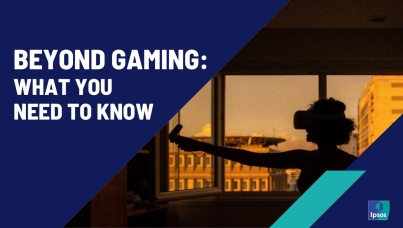Essential Digital Skills UK - 2020
For further information read the full Consumer Digital Index report
Locked Out Before Lockdown: c.9 million people struggled to get online
Key findings from the report (as reflected in the below Lloyd's Banking Group press release) include:
- c.11.7 million people lack the ‘essential digital skills’ needed for day-to-day life online
- But, one in three (33%) have boosted digital skills during lockdown
- Around half (54%) of 18-24 year-olds and 25-34 year-olds (46%) have assisted others with digital skills
The latest Lloyds Bank Consumer Digital Index has revealed that nine million¹ people were unable to use the internet by themselves prior to lockdown, lacking the basic skills required to communicate, shop or bank online.
Research² carried out before the introduction of lockdown restrictions – showed that 16% (c.9m) of the UK population cannot get online without assistance. In total 22% (c.11.7m) of the UK lack the skills needed for everyday life³.
Technology is now a necessity for keeping connected, working remotely and accessing vital information, however just before this huge change, 11%, (c.5.9m) of the population were unable to turn on a device and 12% (c.6.7m) unable to connect a device to a Wi-Fi network by themselves. 25%, (c.13.5 million) people were also unable to use video calling apps, like FaceTime and Skype.
Stephen Noakes, Managing Director, Retail Transformation, Lloyds Bank, said:
"The impact of lockdown has brought into sharp focus just how important digital skills are, when all of a sudden it may be the only way for some people to stay connected to loved ones, buy food or get hold of other essential items such as medicine.
“While this unprecedented situation may have a greater impact on those who remain digitally excluded than those who are online, it is encouraging that this has focused people’s attention on digital capability as a vital life skill. We and many others have responded to this with extra support, including free training through our Academy, but more needs to be done to close the digital divide.
Digital pays dividends
Even before lockdown, people with high levels of digital engagement recognise the benefits of these skills, with 87% saying it helps them stay connected to friends and family, 61% say it improved their ability to get a job, and 44% reporting it helps manage and improve their physical and mental health.
Up-skilling in lockdown
According to a separate poll4 of people in the last few weeks of UK lockdown, three quarters (78%) of the population now believe that the situation has escalated the need to be online and eight out of 10 people (80%) have felt that technology has been a vital support during the outbreak.
One in three (35%) have taken action and boosted their digital skills, with almost a third (31%) reporting they have up-skilled for work reasons, while 37% are using technology more than usual to help with health and wellbeing.
Of those who have improved their skills, over half (57%) are self-taught, with a quarter (25%) calling upon family members for support and one in five (21%) relying on friends.
More than one in three (35%) have also helped other people improve their digital skills during this period, with young people leading the way. Around half (54%) of 18-24 year-olds and 25-34 year-olds (46%) have assisted others with getting online. Staying in touch with others is the most popular reason to ask for help, with almost two thirds (62%) of people helping their family members to use apps such as Zoom or Whatsapp. This is followed by banking and shopping (30%).
Encouragingly, over half (57%) want to continue to boost their skills beyond the current climate, with one in five (20%) having used the time at home to do online learning to improve digital skills.
Helping to address the digital divide
The latest Consumer Digital Index also shows that without any intervention, by 2030, a quarter of the UK will still have a very low level of digital engagement.
Since the COVID-19 crisis took hold, Lloyds Banking Group has been helping more people through the Lloyds Bank Academy. Supporting over 13,000 extra people and businesses to help improve digital skills and confidence with technology.
In addition, through a new partnership with WeAreDigital, a specialist phone line has been introduced to help up to 20,000 customers access the internet and learn new skills to help with everyday digital tasks such as online shopping and connecting virtually with family and friends, as well as online banking. Over 20,000 Digital Champions are also using online volunteering platforms and telephone services to help the most vulnerable in society during this difficult time.
References
- All population figures used in this press release are extrapolated figures from a nationally representative survey conducted by Ipsos of over 4,000 UK citizens 15+
- Conducted by Ipsos, see notes to editors
- The skills needed for everyday life are Communicating, Transacting, Problem Solving, Handling Information and Content and Being Safe, Legal and Confident Online.
- YouGov research
Technical Note
Essential Digital Skills – Ipsos research
On behalf of Lloyds Banking Group, Ipsos interviewed a quota sample of 4,233 participants aged 15+ years in the UK (Great Britain and Northern Ireland) via their face-to-face Omnibus between 10th-27th January 2020. Quotas were set by age, gender, working status, property tenure and region and data are weighted to represent the known population of this audience. Within this report we have included population estimates from the survey data based on ONS 2018 mid-year stats for the UK.
Extrapolations used in the above with their associated margins of error can be found below:
-
Those who lack the Essential Digital skills for life – 22%, an estimated 11.7 million (11.1m - 12.4m)
-
Those who are unable to use video tools - 25%, an estimated 13.5 million (12.8m – 14.2m)
-
Those who do not have Foundation level skills - 16%, an estimated 9 million (8.4m – 9.6m)
-
Those who are unable to turn on a device by themselves – 11%, an estimated 5.9 million (5.4m – 6.4m)
The Essential Digital Skills Framework defines the ‘essential digital skills’ needed to safely benefit from, participate in and contribute to the digital world of today and the future. The framework is intended to be used by everyone in the UK engaged in supporting adults to enhance their essential digital skills. The benefits of working to a common framework include enabling progression and transferability of skills – as well as facilitating measurement. Changes have been subject to wide consultation across employers, charities, national and local government departments, academics and individuals. The most significant change to the framework is the introduction of distinct ‘skills descriptions’ for life and work, to demonstrate progression.
The framework also includes a section on ‘foundation’ skills, which are those typically required by people not currently using digital technology or using it in limited ways. It is assumed that people gaining these foundation skills will also have the motivation and confidence to engage with digital technology.
There are five categories of Essential Digital Skills for life and work:
-
Communicating
-
Handling information and content
-
Transacting
-
Problem solving
-
Being safe and legal online
The consultation and update of the framework were coordinated by Lloyds Banking Group and the Tech Partnership, overseen by a steering group including Accenture, Amazon, BT, British Retail Consortium, Corsham Institute, DfE, DCMS, DWP, Federation of Small Businesses, Good Things Foundation, Greater London Authority, Greater Manchester Combined Authority, HMRC, Microsoft, NHS Digital, the Scottish Council for Voluntary Organisation (SCVO) and SSE. In total, 400 partners contributed to the public consultation. For the annual measure of this framework, please refer to the Lloyds Bank Consumer Digital Index.
The Lloyds Bank Consumer Digital Index
Over the last five years, the Consumer Digital Index has been establishing an understanding of UK digital adoption. 2,700 Lloyds Banking Group customers (Lloyds, Halifax and Bank of Scotland) are surveyed via the telephone, and data matched with transactional behavioural data. The transactional data set is scaled to one million consumers, the largest data set on digital inclusion in the UK. The research was conducted between 11th November to 20th December 2019 by Gusto.
* YouGov Fieldwork was undertaken between 5th - 6th May 2020. The survey was carried out online. The figures have been weighted and are representative of all GB adults (aged 18+).’Total sample size was 2137 adults.
Lloyds Bank Academy
The Lloyds Bank Academy was set up to help tackle the digital divide, providing free face-to-face and online digital skills training to everyone at locations across Manchester, Stockport, Oldham and Salford. Set up by Lloyds Bank in 2018 and supported by partners including Serco, Upskill Digital, Google, Job Centre Plus, the Academy scheme helped over 65 000 people, charities and businesses in 2019. Its curriculum is focused on skills designed to help in everyday life and at work, with practical exercises to help people turn knowledge into action. Having paused our face-to-face programme, the Lloyds Bank Academy has pivoted to place all focus onto building new training and creating a series of online classes for small businesses. These provide dedicated online training, the ability to hear from experts and virtual networking for small businesses and charities. We will soon to be launching this through our retail channels to continue to support people with the essential digital skills.
WeAreDigital
On 16th April, we launched a brand-new helpline in partnership with We Are Digital, to help people access digital skills support. This is unique to the market and will provide not just remote help via a telephone, but customers with a need could also be provided with a basic tablet device. We are reaching out to customers directly who could benefit from this service. Customers can access help with a range of key skills to support them through this period of isolation, including food shopping, using NHS website and booking GP appointments, video calling and internet banking. This has already provided life changing support to over 650 customers, enabling them to stay safe within their home by accessing essential services online.
Lloyds Banking Group
Lloyds Banking Group is the largest digital bank in the UK, with more than 16 million customers actively managing their account online and over eleven million on mobile. We are investing £3bn during the next phase of our strategy, with a strong focus on technology and people.
The transformation of the Group is linked to our purpose of helping Britain prosper, and we will demonstrate our expertise as the UK’s largest digital bank through our brands.






